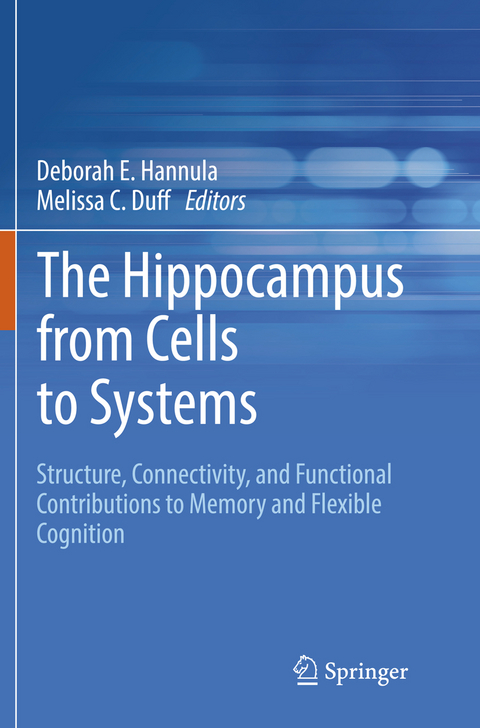
The Hippocampus from Cells to Systems
Springer International Publishing (Verlag)
978-3-319-84393-3 (ISBN)
The hippocampus has long been considered a critical substrate in the neurobiology, neuropsychology, and cognitive neuroscience of memory. Over the past few decades, a number of ground-breaking theoretical and methodological advances have radically enhanced our understanding of the structure and function of the hippocampus and revolutionized the neuroscientific study of memory. Cutting across disciplines and approaches, these advances offer novel insights into the molecular and cellular structure and physiology of the hippocampus, the role of hippocampus in the formation, (re)consolidation, enhancement, and retrieval of memory across time and development, and permit investigators to address questions about how the hippocampus interacts, functionally and anatomically, with other neural systems in service of memory. In addition, recent investigations also suggest that the mechanistic properties and functional processing features of the hippocampus permit broader contributions to cognition, beyond memory, to the domains of attention, decision-making, language, social cognition, and a variety of other capacities that are critical for flexible cognition and behavior. These advances have profound implications for the neurobiology and cognitive neuroscience of hippocampus dependent cognition and for the numerous psychiatric and neurological diseases and disorders for which hippocampal pathology is a hallmark such as Alzheimer's disease and schizophrenia.
The goal of this book is to bring together in a single source an integrated review of these advances providing state of the art treatment on the structure and function of the hippocampus. Contributors will examine the hippocampus from a variety of levels (from cells to systems) using a wide range of methods (from neurobiological approaches in non-human animals to neuroimaging and neuropsychological work in humans).
Deborah Hannula is an Associate Professor and the Associate Chair of the Department of Psychology at the University of Wisconsin, Milwaukee. As the director of the MINDfull of Memory Laboratory, much of Dr. Hannula's research has focused on contributions made by the hippocampus to working memory and unconscious or implicit expressions of memory. Current work examines interactions between long-term memory and attention with particular focus on questions about whether attention might be captured by long-term memories and the neural substrates that drive these effects. To address research questions in each of these domains, Dr. Hannula's lab combines eye tracking, functional MRI, and neuropsychological methods. Dr. Hannula has received research funding from the National Institutes of Health and, most recently, was the recipient of a Career Award from the National Science Foundation. She has published nearly 30 articles that examine the basic constructs and neural correlates of learning and memory, and her research was featured recently in the 2015 Edition of the UWM Research Report. For more information about Dr. Hannula's work, interested parties are invited to visit her lab website: https://sites.google.com/site/mindfulofmemorylab/home
Part 1: The Molecular and Cellular Structure and Physiology of the Hippocampus.- 1. The Hippocampal Formation: Cell Structure and Patterns of Connectivity.- 2. Hippocampal Neurogenesis: Discovery and Current Concepts.- 3. Principles of Hippocampal Cellular Function: Transcending Space and Time.- 4. Creating, Updating, and Erasing the Hippocampal Engram.- 5. Oscillatory Dynamics: Hippocampal Memory Networks.- Part II: Extending the Reach of the Hippocampus: Development, Aging, and Functional Contributions to Flexible Learning and Memory.- 6. Multiple Memory Systems: Competing Perspectives.- 7. Beyond Long-Term Declarative Memory: Hippocampal Contributions to Perception, Short-Term Retention, and Unconscious Memory Expression.- 8. Escaping the Past: Contributions of the Hippocampus to Imagination and Mental Simulation.- 9. Hippocampal Structure and Function Across the Lifespan: Development.- 10.Hippocampal Structure and Function Across the Lifespan: Aging.- 11. Physical Fitness and Cognitive Training: Impact on Hippocampal Structure and Function.- 12. Sleep and Hippocampus-Supported Memory Consolidation.- Part III: Hippocampal Contributions to Flexible Cognition.- 13. Interactions between attentional mechanisms and memory processes.- 14. The hippocampus and inferential reasoning: Building memories to navigate future decisions.- 15. Motivated memory: How what we want and desire shapes what we learn and remember.- 16. Hippocampal contributions to language: From online processing to the creative and flexible use of language.- 17.Hippocampus and social cognition: The role of memory in thinking about the self and others.- 18.Dynamic networks of HC-PFC and Clinical Populations
"This is a detailed monograph on the neurophysiology of the hippocampus in animals and humans. ... I recommend this book to neurologists, neurophysiologists, psychiatrists, psychologists, and neurosurgeons with a strong interest in the hippocampus and its rles in the brain." (Joseph Grenier, Amazon.com, November, 2017)
| Erscheinungsdatum | 29.07.2018 |
|---|---|
| Zusatzinfo | X, 589 p. 68 illus., 50 illus. in color. |
| Verlagsort | Cham |
| Sprache | englisch |
| Maße | 155 x 235 mm |
| Gewicht | 908 g |
| Themenwelt | Geisteswissenschaften ► Psychologie ► Allgemeine Psychologie |
| Medizin / Pharmazie ► Studium | |
| Naturwissenschaften ► Biologie ► Humanbiologie | |
| Schlagworte | anatomy • Flexible Cognition • Health, Development, and Aging • neuroimaging • Neurophysiology • Relational Memory |
| ISBN-10 | 3-319-84393-1 / 3319843931 |
| ISBN-13 | 978-3-319-84393-3 / 9783319843933 |
| Zustand | Neuware |
| Haben Sie eine Frage zum Produkt? |
aus dem Bereich


